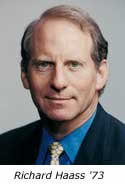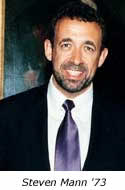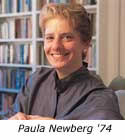|
Looking
Ahead in a New World,
Page 2
Global
Warnings What’s next for U.S policy in Central Asia?
by Michael Doyle ’78
 In
identifying policy experts on Central Asia these past months, U.S.
officials and the media turned to an Oberlin cohort from the early
1970s. Based in Washington, D.C., but globe-trotting ceaselessly,
Richard Haass ’73, Steven Mann ’73, and Paula Newberg
’74 have come to play different roles in the discordant region.
Haass and Mann hold the rank of ambassador and, in their respective
State Department posts, champion U.S. policy—Haass as the State
Department’s temporary point man on Afghanistan and Mann as
the top U.S. adviser on Caspian Basin energy. Newberg has served
as an adviser to the United Nations in Afghanistan and Central Asia
and understands well the calamitous politics and humanitarian catastrophes
that mark the territory. In
identifying policy experts on Central Asia these past months, U.S.
officials and the media turned to an Oberlin cohort from the early
1970s. Based in Washington, D.C., but globe-trotting ceaselessly,
Richard Haass ’73, Steven Mann ’73, and Paula Newberg
’74 have come to play different roles in the discordant region.
Haass and Mann hold the rank of ambassador and, in their respective
State Department posts, champion U.S. policy—Haass as the State
Department’s temporary point man on Afghanistan and Mann as
the top U.S. adviser on Caspian Basin energy. Newberg has served
as an adviser to the United Nations in Afghanistan and Central Asia
and understands well the calamitous politics and humanitarian catastrophes
that mark the territory.
The three have known each other in varying degrees over the years.
Each brings a unique perspective to the world revealed by September
11; each is shaping the world that comes next. Ambassador Richard
Haass sought the tough problems. He’s got them now, in triplicate.
As chief of the State Department’s storied policy planning
staff, Haass handles responsibilities unimagined when he was sworn
in last year. The fitful Northern Ireland peace process seemed then
to be among his biggest concerns; the Irish Times covered his appointment
extensively. Then terror struck at home.
“I had paid some attention to Afghanistan,” Haass says,
“but to be frank, it wasn’t much before September 11.
I spent a lot of time in South Asia, although my focus was on India
and Pakistan.”
It's been a quickly evolving cascade of events, with the rapid collapse
of the Taliban throughout most of Afghanistan in November. In October,
Secretary of State Colin Powell tapped Haass as an emissary for
Afghanistan. Talk about intractable. Working in many environments,
Haass has had to handhold, cajole, calculate, and in all ways move
the diplomatic levers to advance diverse U.S. interests. Then the
State Department added another envoy, James Dobbins, as its representative
to various Afghan opposition groups, and Haass turned his focus
to work within the United States and United Nations on Afghanistan
issues.
The former Rhodes Scholar, who earned his PhD at Oxford, says the
United States is “clearly looking to the U.N. to play a central
role in molding Afghanistan’s postwar future.” The U.S.,
though, must lead. This centrality of U.S. leadership has marked
Haass’ thinking both in and out of government. His book The
Reluctant Sheriff: The United States after the Cold War—one
of 11 he’s written or edited—pinned the star of international
leadership squarely on Uncle Sam.
“I think it’s incumbent upon our country to take the lead
and, in many cases, organize coalitions of those parties able and
willing to work with us toward common goals,” Haass told the
Senate Foreign Relations Committee last April. “That is where
the notion of the sheriff comes. At times we have to overcome our
own reluctance to do that, to lead.”
Thus, in October, Haass met in Italy with the octogenarian former
king of Afghanistan, Mohammad Zahir Shah. The king had ruled for
40 years before being deposed in 1973. The aged king may seem an
unlikely ruler now, but a tribal council—a loya jirga —under
his aegis and designed to shape a new leadership coalition, has
become a popular idea.
“It’s our goal to try to encourage the emergence of a
broad-based Afghan government that reflects the composition of the
population, that enjoys support and legitimacy, and that has workable
relations with its neighbors,” Haass says. “The goal is
to bring it about, using Afghans both inside and outside of the
country. It's going to have to be representative. Is the potential
there? The answer is yes.”
Questions nonetheless abound. In 1989, a previous tribal council
without the king’s involvement failed to establish a lasting
coalition among seven major Afghan factions. It is unclear whether
members of the Taliban could be part of a new ruling coalition.
Pakistan, whose fearsome Inter-Services Intelligence Directorate
helped spawn the Taliban in the mid-1990s, has envisioned an enduring
role for moderate Taliban leaders. But other countries, including
Russia, India, and Tajikistan, aren’t keen on the idea.
Holding together an anti-terror alliance poses other dilemmas as
well.
“Often the most important decisions in foreign policy involve
trade-offs,” Haass says, “so obviously we're going to
make some difficult decisions, but that’s always the case in
foreign policy.”
Consider human rights. Tajikistan can help the U.S. effort in neighboring
Afghanistan. Tajikistan is also ruled by an authoritarian regime
whose security forces “frequently tortured, beat, and abused
detainees,” according to the State Department’s 2000 human
rights report. Uzbekistan is allowing use of its territory for the
U.S. effort. Uzbekistan’s security forces also “arbitrarily
arrested or detained pious Muslims and other citizens on false charges,
frequently planting narcotics, weapons, or forbidden literature
on them,” the State Department reported.
“One of the challenges facing the U.S. government is tending
to the various aspects of post-September 11 policy without losing
sight of other U.S. foreign policy goals,” Haass says. He mentioned
specifically U.S. policies toward al-Qaeda and Afghanistan, terrorism
more broadly, the promotion of open trade, stopping the proliferation
of weapons of mass destruction, and promoting civil society and
democracy.
Pakistan in particular poses dilemmas. Led by a general, it is a
country in which the constitution and parliament have been suspended
and which teeters periodically on the brink of war with India. But
Pakistan also shares a porous 1,500-mile border with Afghanistan
and is essential to the United States.
“This is a leadership that faces tremendous challenges,”
Haass says of Pakistan. “It has major interests in Afghanistan.
It also faces a difficult relationship with India, and internally
it has significant economic problems and political divisions. It
appears to be moving to reach out, and, obviously, the United States
is prepared to help to the extent that we can.”
Haass previously puzzled over Pakistan while in the first Bush administration,
in which he was senior director for Near East and South Asian affairs
at the National Security Council. He worked with Powell during the
Persian Gulf War, the one Iraqi President Saddam Hussein proclaimed,
with perhaps more prescience than he was given credit for, would
be “the mother of all battles.”
This time around, Powell chose Haass to head the State Department’s
own internal think-tank, though the policy planning staff lacks
the luxurious remove of an ivory tower.
“It’s my job to provide the secretary of state with medium-
and long-term advice,” Haass says, adding ruefully that he
spends “an awful lot of time in meetings.”
From which, history shows, come ideas that change the world. The
policy planning staff first convened in 1947, as post-war Europe
was economically disintegrating and Stalinist Russia was expanding.
Secretary of State George Marshall summoned diplomat Chester Bowles
to create the staff so that the State Department could play offense
as well as defense.
“Marshall had only one bit of advice for me,” Bowles recounted
in his autobiography. “Avoid trivia.”
The ambitious Marshall Plan for the recovery of Europe soon resulted.
Now it’s Haass’ turn to help concoct plans whose names
and consequences history will grade.
Oil
in a Tough Neighborhood
Someday, Afghanistan may calm. When it does, Ambassador Steven Mann
would like to see the larger region thrive and the United States
be well positioned. “We need to do everything we can now so
that when this war is over, the states of Central Asia and the Caucasus
will have a real basis for prosperity,” he says.
 A
two-time German major, Mann began keeping his fingers on the region’s
pulse long before taking his current job as Caspian Basin energy
adviser. He served as U.S. ambassador to Turkmenistan for two-and-a-half
years and knows how dicey things can get for this frontline state.
Turkmenistan shares a 461-mile border with Afghanistan, a 615-mile
border with Iran, and a significant coastal piece of the oil-rich
Caspian Sea. “The Turkmen know they live in a rough neighborhood,”
he says. A
two-time German major, Mann began keeping his fingers on the region’s
pulse long before taking his current job as Caspian Basin energy
adviser. He served as U.S. ambassador to Turkmenistan for two-and-a-half
years and knows how dicey things can get for this frontline state.
Turkmenistan shares a 461-mile border with Afghanistan, a 615-mile
border with Iran, and a significant coastal piece of the oil-rich
Caspian Sea. “The Turkmen know they live in a rough neighborhood,”
he says.
Some neighbors, notably Uzbekistan, enlisted publicly in the U.S.
campaign against the Taliban regime in Afghanistan. The role of
Turkmenistan in the post-September 11 campaign is delicate, although
in late October it agreed to allow U.N. aid workers to operate on
its Afghan border. Its role in the region’s future is likewise
a work in progress.
“Turkmenistan in the past always had cordial relations with
the Taliban,” Mann noted. “Turkmenistan tries to have
businesslike relations with all of its neighbors—with Afghanistan,
with Iran, with Uzbekistan.”
Businesslike is not bad; it is, after a fashion, Mann’s own
approach now. As Secretary of State Powell’s senior advisor
for Caspian Basin energy diplomacy, Mann considers the region’s
big picture. One very big goal is construction of a 1,075-mile pipeline
to carry oil from the Caspian seaport of Baku to the Turkish Mediterranean
port of Ceyhan.
“With Central Asia and the Caucasus, we have tried to do something
that doesn’t come naturally to Americans, which is to play
the long game,” Mann says. “This war places a spotlight
on Central Asia, and it’s even more important to press ahead
with Caspian energy development because we’re looking for long-term
stability.”
Mann insists the so-called Baku-Tbilisi-Ceyhan oil pipeline will
be entirely secure, notwithstanding the region’s turmoil. All
of the countries involved, he says, “have an interest in having
the pipeline built…it’s hard for me to see (the terrorism
crisis) spilling over” to hinder the project.
“The Caspian nations’ needs are pretty consistent,”
he added. “They must export their energy. Our policy is consistent,
too; we want to help them do that. The pipelines we’re building
are going to be secure. There’s not a security threat out there
that’s not manageable.”
Construction of the $2.5-billion oil pipeline begins early next
summer. By connecting Azerbaijan, Georgia, and Turkey—bypassing
cheaper but more politically troublesome routes through Iran—the
pipeline would serve multiple interests. The diplomatic theory is
that the United States wins by binding countries closer to the West.
The related economic theory is that the rising tide from a million
barrels of Caspian Sea crude oil conveyed daily will lift all of
the impoverished countries.
“The countries of Central Asia and the Caucuses can use the
revenues from this oil and gas to build their societies and strengthen
their independence,” Mann says. “That is an important
strategic goal for the United States, so there are good reasons
for us to work together. We’ve been doing it for years, and
the Bush administration wants to push ahead.”
Turkmenistan is not a direct party to the big oil pipeline, but
other forms of energy development are still crucial to the largely
desert country. It’s the old story: rich in resources, poor
in fact. The country of 4.6 million residents claims the fifth-largest
natural gas reserve in the world. And yet nearly 60 percent of the
residents in this country the size of California live below the
poverty line.
“The economy, year by year, crumbles a little bit more,”
Mann says. “They’re concerned about schooling their kids.
They’re concerned about social services and infrastructure.
Politics are very low on their list of daily concerns. Their number
one concern is making a living.”
A Foreign Service officer since 1976, Mann first toured the tree-shaded
streets of Turkmenistan’s capital in July 1980. The country
was still suffocating in the Soviet Union’s bear hug. Across
the border in Afghanistan, Soviet troops were in the first year
of a bloody and futile venture. Turkmenistan achieved its independence
when the Soviet Union dissolved in 1991 and, according to Mann,
it is a “very stable country.” The stability comes at
a high price. President Saparmurat Niyazov, according to the CIA’s
World Factbook, “retains absolute control over the country,”
and opposition is not tolerated.
“He is the president for life and has an enormous cult of personality,”
Mann says.
In 1992, Niyazov won re-election with a Stalinist-era margin of
99.5 percent of all votes cast. There is no free press, and the
country’s overall human rights record is characterized as “extremely
poor” by the State Department.
“An argument I have often heard is that the Turkmen have an
‘Asian mentality,’ and so they are not comfortable with
democracy as we understand it,” Mann said in his farewell remarks
as ambassador last May. “I reject this idea. I have never heard
a single average Turkmen citizen, in my two-and-a-half years here,
say that he or she did not want to see honest newspapers and television
and read honest facts about the nation’s progress.”
Back in the United States, working in State Department headquarters
tightly wrapped in wartime security, Mann now casts his mind beyond
the travails of President Niyazov’s Turkmenistan. But, following
a mid-October interview, preparing to meet with U.S. oil company
executives waiting in his outer office, he paused to give a pitch
for a service well suited to the Oberlin ethos.
“As a result of the war, we’re seeing in the Foreign Service
an even greater sense of pride in what we do and what we represent,”
Mann says. “We’ve got admirable leadership in the State
Department, and regardless of the area we’re working in, there’s
a sense of mission.”
This Foreign Service veteran says something else. “Talk to
Paula Newberg,” he urged. “You’ve got to talk to
Paula.”
Anarchy
Is Always Worse
Paula Newberg has her doubts. And, working outside of government,
she can openly express them. Long active in human-rights and humanitarian
issues, Newberg questions the U.S. military strategy initiated last
fall with cruise missiles and laser-guided bombs.
“I don’t happen to think that bombing the guts out of
Afghanistan is the best way to fight global terrorism,” Newberg
said in October. Briefly a Peace Corps country director in Central
Asia and a long-time commentator on international politics (she
and Haass were both at the Carnegie Endowment for International
Peace in the mid-1990s), Newberg questions the trade-offs now made
as the United States rallies an anti-terror coalition.
 “It’s
easy for me to say, (because) I’m out of government and I can
operate on different set of principles. What we are doing right
now is buying off seemingly pliant but habitually rights-violating
governments with whom we believe we need to undertake an anti-terrorist
campaign,” Newberg says. “That is not likely to stand
us in good stead over the long term. “It’s
easy for me to say, (because) I’m out of government and I can
operate on different set of principles. What we are doing right
now is buying off seemingly pliant but habitually rights-violating
governments with whom we believe we need to undertake an anti-terrorist
campaign,” Newberg says. “That is not likely to stand
us in good stead over the long term.
“These actions are understandable, given the tactics and strategies
that have been adopted,” Newberg conceded, but “that doesn’t
make it right for the long term. And it certainly doesn’t make
it right for the people who live in these countries.”
As the U.N.’s former special advisor for Afghanistan from 1996
through 1998, Newberg has been skeptical of where the United States
has been placing its bets. The Northern Alliance, for one. It sounds
like a coherent partner, but is not.
“The Northern Alliance does not stand for anything in particular,”
Newberg says. “It is a familiar gallery of rogues whose attitude
toward the population of Afghanistan was and is less than beneficent.
This was a group of commanders who until recently had been fighting
one another as well as fighting the Taliban, and they continued
fighting among each other while they were fighting the Taliban.
It’s not the same thing as having a government and an organized
opposition. Commanders have been reorganizing themselves to suit
the circumstances.”
Newberg now advises the United Nations Foundation, a private group
aiding U.N. causes through a $1-billion gift committed by CNN founder
Ted Turner. A New Yorker—“I like large, complicated, gritty
places”—Newberg says it was a bit of an accident that
brought her face-to-face with Afghanistan for the first time. It
was in March 1980, and she was attending a meeting of the United
Nations in India after spending the winter as a member of the U.S.
delegation to the U.N. Human Rights Commission. She traveled from
New Delhi to Pakistan and then decided to check out the border where
the first Afghan refugees were just arriving.
In the years that followed—during the anti-Soviet war and after
the Soviet army left and the United States turned its back on Afghanistan—Newberg
made countless trips to South and Southwest Asia, many on behalf
of international human-rights organizations. Local experience became
an important teacher. Her doctorate from the University of Chicago
in comparative politics and social theory provided an outline, but
not details. Her primary foreign languages had been French, German,
and Czech, not Pukhto or Dari or South Asia’s varied vernaculars.
After years in the region, however, she went on to author books
and monographs about Pakistan, Afghanistan, and Kashmir and to teach
at Columbia and Johns Hopkins.
While watching Pakistan’s governance decline in the mid-1990s,
Newberg also saw firsthand the rise of the Taliban; she recognized,
for all its militant rigidity, the Taliban’s appeal for a country
accustomed to chaos.
“The Taliban did allow people to begin recapturing a stable
home life,” Newberg says. “There are people who are actually
sympathetic to the Taliban. They may not like the ideological stricture,
although some do, but they did like the fact that anarchy was kept
in lien.”
She saw, and was vexed by, U.S. foreign policy at the time.
“We’ve been patronizing all sorts of folks, including
Osama bin Laden when it suited our convenience,” Newberg says.
“It was our convenience to support Pakistan and the Taliban
in 1994 and 1995, although it was clear even then, particularly
to people living in the region, that it was not a good idea to have
done so. We took a short-term, tactical move, and it was a bad idea—for
Afghanistan, Pakistan, and many of their neighbors. We are now taking
other, familiar, short-term moves.”
She believes now, as do others, that the United Nations could be
crucial if Afghanistan is ever to rebuild itself. It is not necessarily,
or appropriately, the United States’ job to build that ruling
coalition, she says; it is, she believes, “highly arrogant
for any state to try to put any government in place anywhere.”
“I think the U.N. can best act as an umpire or as a trustee,
in the process of trying to determine how it can best help the Afghan
people decide for themselves how they want to be governed,”
she says. “There has to be a playing field established in which
no one is patronized simply by having gained military ascendancy.”
She knows what awaits Afghanistan if all governance fails.
“Anarchy is always worse.”
Mike
Doyle is a reporter for McClatchy Newspapers in Washington,
DC.
View
Page 1 | 2
| 3 | 4
| 5 of Looking Ahead in a New
World
|



 In
identifying policy experts on Central Asia these past months, U.S.
officials and the media turned to an Oberlin cohort from the early
1970s. Based in Washington, D.C., but globe-trotting ceaselessly,
Richard Haass ’73, Steven Mann ’73, and Paula Newberg
’74 have come to play different roles in the discordant region.
Haass and Mann hold the rank of ambassador and, in their respective
State Department posts, champion U.S. policy—Haass as the State
Department’s temporary point man on Afghanistan and Mann as
the top U.S. adviser on Caspian Basin energy. Newberg has served
as an adviser to the United Nations in Afghanistan and Central Asia
and understands well the calamitous politics and humanitarian catastrophes
that mark the territory.
In
identifying policy experts on Central Asia these past months, U.S.
officials and the media turned to an Oberlin cohort from the early
1970s. Based in Washington, D.C., but globe-trotting ceaselessly,
Richard Haass ’73, Steven Mann ’73, and Paula Newberg
’74 have come to play different roles in the discordant region.
Haass and Mann hold the rank of ambassador and, in their respective
State Department posts, champion U.S. policy—Haass as the State
Department’s temporary point man on Afghanistan and Mann as
the top U.S. adviser on Caspian Basin energy. Newberg has served
as an adviser to the United Nations in Afghanistan and Central Asia
and understands well the calamitous politics and humanitarian catastrophes
that mark the territory. A
two-time German major, Mann began keeping his fingers on the region’s
pulse long before taking his current job as Caspian Basin energy
adviser. He served as U.S. ambassador to Turkmenistan for two-and-a-half
years and knows how dicey things can get for this frontline state.
Turkmenistan shares a 461-mile border with Afghanistan, a 615-mile
border with Iran, and a significant coastal piece of the oil-rich
Caspian Sea. “The Turkmen know they live in a rough neighborhood,”
he says.
A
two-time German major, Mann began keeping his fingers on the region’s
pulse long before taking his current job as Caspian Basin energy
adviser. He served as U.S. ambassador to Turkmenistan for two-and-a-half
years and knows how dicey things can get for this frontline state.
Turkmenistan shares a 461-mile border with Afghanistan, a 615-mile
border with Iran, and a significant coastal piece of the oil-rich
Caspian Sea. “The Turkmen know they live in a rough neighborhood,”
he says. “It’s
easy for me to say, (because) I’m out of government and I can
operate on different set of principles. What we are doing right
now is buying off seemingly pliant but habitually rights-violating
governments with whom we believe we need to undertake an anti-terrorist
campaign,” Newberg says. “That is not likely to stand
us in good stead over the long term.
“It’s
easy for me to say, (because) I’m out of government and I can
operate on different set of principles. What we are doing right
now is buying off seemingly pliant but habitually rights-violating
governments with whom we believe we need to undertake an anti-terrorist
campaign,” Newberg says. “That is not likely to stand
us in good stead over the long term.